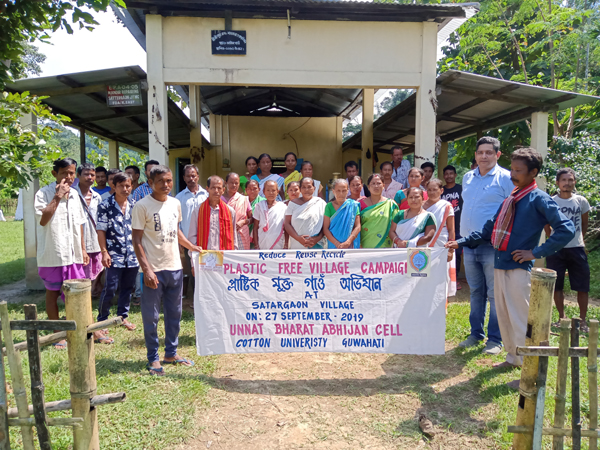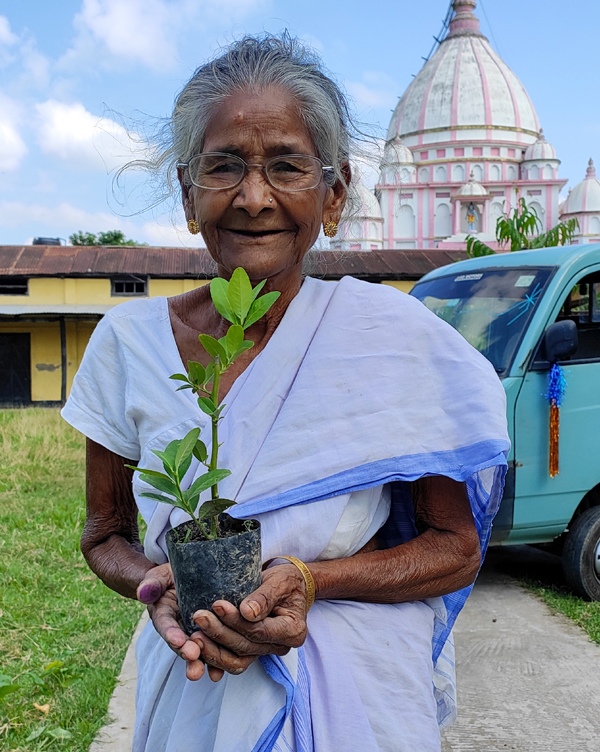Swacchata Awareness Campaign
Swacchata Awareness Campaign was carried out by students of Cotton University in these five villages include Nij Panbari, Hajongbori, Keotpara, Chakardo-Kalitapara and Satargaon and highlights the matters of proper sanitation and hygiene and the importance of cleanliness in various aspects of daily life to the villagers.
Mushroom Cultivation Training Program at Keotpara and Satargaon
The mushroom cultivation training programme was conducted by a team of experts from Department of Biotechnology, Bodoland University, Kokrajhar. The workshops witnessed impressive number of participants in both the villages, irrespective of age and gender. They received knowledge on edible mushrooms, its food value and increasing demand with hands on training on cultivation process, storage and marketing of mushroom. It is to be noted that some of the villagers have taken up mushroom cultivation as an alternative source of livelihood after this training. Similar trainings are proposed to be held in the other adopted villages also.
Plastic free Campaign
UBA Cell of Cotton University is giving due priority to the Plastic free Campaign initiated by the Govt of India. Team members visited all the villages to spread awareness on hazards of plastic use and to request the villagers to strive to make their village plastic free. PowerPoint presentations were made to show the children and the elders how single use plastics are harming us on a daily basis. The villagers have been allotted a place, in every village, where the collected plastics need to be dumped, for proper collection or recycling as may be possible. As per the UBA mandate, cloth bags were distributed among the villagers, and women were also trained to make cloth bags as a source of alternate livelihood option.
Outreach workshop “Seeing the Unseen” of DBT Foldscope Project
We have organised a day-long outreach workshop on the DBT Foldscope at Panbari High School, Nijpanbari Village on in association with the PI of the project Dr. Anjana Singha Naorem and her Research Assistants, Department of Zoology, Cotton University. The workshop began with a talk on introduction of Foldscope and its various applications and its advantage, which was followed by the screening of a video on its assembly. The second session was hands-on training of the students on assembly of Foldscope and course related practical.
Snakebite management and awareness
A village-level talk on snakebite management and awareness was conducted at Satargaon village. Mr. Rajib Rudra Tariang, Assistant Professor, Digboi College was the key resource person of the event. He talked about the common snakes, which are found in and around human habitations and how to identify venomous from non-venomous snakes through audio-visual presentation. Photographs of different snakes were shown to the villagers and a general description of each of the snakes found in that area was made. Around 50 people including school students attended the talk. The second part of the talk was on snakebite prevention and management.
Lemon saplings distribution and fruiting trees plantations
Dr Narayan Sharma, Joint Coordinator of UBA Cell of Cotton University has implemented a project entitled, “Towards sustainable and green villages: Plantation of lemon and other fruit-bearing trees in five villages located near Guwahati city, Assam, north-east India.”In this project, he has distributed over 9,000 lemon saplings to 1,000 beneficiaries and planted 600 saplings of fruiting trees of more than 30 species in five adopted and one non-adopted villages (Patgaon). The project was implemented in collaboration with Dusty Foot Foundation and Mahindra Logistics.
Planting and distribution of saplings
Another very successful activity taken up by the UBA cell, was the plantation drive, which was organized as a part of the World Environment Month. During the drive, the UBA cell team planted a few saplings in every village and distributed around 200 saplings of essential trees like neem, lemon, guava, mango, pomegranate, jamun etc., to the villagers to plant either in their homes or at strategic locations in and around the villages. The need to care for the plants till they grow up was stressed upon. This is an endeavor to strive for a greener world.
Initiatives taken during the COVID19 lockdown
Even during the COVID-19 pandemic, we have been in touch with the Village Headmen (Gaonburha) and School Headmasters of the five villages to assess their awareness on the illness and safety measures that need to be taken. Leaflets on Awareness of COVID 19, Basic care and Precautions (in Assamese language) were sent to the headmasters for distribution amongst the villagers from our side. The UBA cell also took the initiative to distribute food and essential products to the families in need, at Kalitapara and Nijpanbari.
Gram Sabhas
Additionally, to identify the key issues of the villages that need urgent interventions, Gram Sabhas were also organized. Based on these consultations, some basic problems have been addressed and some are about to be addressed in the coming months. The members of the UBA Cell of the University are in the process of drafting Village Development Plans, which will then be sent to the UBA seeking financial assistance to implement the program.
Street Play
In order to sensitize the local people about the Sanitation and Hygiene, street plays were performed in the adopted villages—Keotpara, Kalitapara and Satargaon. The students of the Department of Mass Communication and Journalism, Cotton University performed the play on 26 March 2021.



